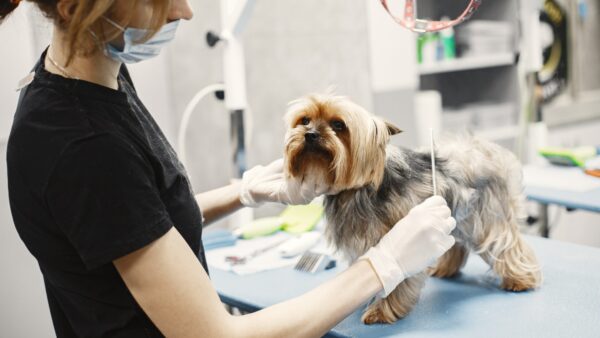Why is dog daycare important to your dog’s health?
Dog Daycare: Where Every Pup Finds Joy and Play.
We all want the best for our dogs. Whether it’s giving them the tastiest treats, the most comfortable bed, or the most exciting toys, our pets deserve nothing but the best. An important aspect of dog welfare that is often overlooked is their socialization and activity during the day, especially when we are busy. This is where dog daycare can make a significant difference. But why is dog daycare so important? Let us examine the main reasons for this.
Acculturation:
Positive Relationships:
Dogs are naturally social animals that thrive on interacting with others. Regular exposure to different dogs and humans helps them learn appropriate social behavior, reducing the likelihood of aggression or fear-based reactions. This is especially important for puppies, as early socialization can shape their temperament for life. They learn to play well, share toys, and understand social cues from other dogs.
Avoid Loneliness:
Loneliness and boredom can lead to anxiety and destructive behaviors. Dog daycare provides companionship and interaction, ensuring your pet stays happy and engaged. For dogs living alone for long hours, the social environment of daycare can prevent isolation that can lead to depression and anxiety.
Build Confidence:
Regular socialization in a controlled environment can help shy or nervous dogs build confidence. Positive experiences with other dogs and people can significantly improve their overall behavior and temperament. For rescue dogs or those with traumatic pasts, this can be an important part of their recovery.
Exposure to New Experiences:
Daycare environments often introduce dogs to new sights, sounds, and smells, which can help them become more adaptable and less fearful of unfamiliar situations. This exposure can make everyday activities, such as doctor visits or car rides, less stressful.
Workout:
Physical Health:
A good daycare ensures that your dog gets enough physical activity, which is vital to maintaining a healthy weight and preventing obesity-related problems. Regular exercise improves cardiovascular health, strengthens muscles, and keeps joints flexible. Active play sessions, walking, and even agility training can be part of a good exercise regimen.
Manage Energy:
High-energy breeds, in particular, benefit from structured play and exercise provided by daycare. This helps to release excess energy, making them more relaxed and better behaved at home. For working breeds like Border Collies or Australian Shepherds, daycare can provide the mental and physical challenges they crave.
Reducing Behavioral Problems:
Exercise is a dog’s natural source of energy. Without adequate physical activity, dogs can develop behavioral problems such as excessive barking, chewing, or digging. Daycare helps alleviate these problems by providing a productive way to expend energy. Regular exercise also releases endorphins, which can improve a dog’s mood and overall health.
Personalized Activities:
Many doggy daycares offer activities tailored to the needs of different dogs, such as fetching for retrievers, tug-of-war for terriers, or swimming for water-loving breeds. These special activities ensure that each dog gets the type of exercise they enjoy the most.
Mental Incentives:

Always Minimize Boredom:
Boredom is a common cause of destructive behavior in dogs. Dog daycare offers a variety of activities and environments that keep your pet mentally active, reducing the likelihood of destructive behaviors. Activities such as puzzle toys, interactive games, and training exercises can challenge a dog’s brain.
Increase Physical Activity:
Engaging activities such as puzzle toys, agility courses, and training sessions challenge your dog’s brain and enhance their cognitive functions. This mental stimulation is just as important to a dog’s overall health as physical exercise. Cognitive challenges can also slow the brain decline that comes with aging.
Learn New Skills:
Many daycares incorporate basic training into their daily routine, helping dogs learn new commands and behaviors. This can reinforce good manners and obedience, making it easier to manage your dog at home. Training sessions can include basic commands, leash manners, and even tricks, making learning fun and rewarding for your dog.
Adaptability:
Regular exposure to new environments and activities can make dogs more adaptable and less stressed in new situations. This adaptation can be beneficial when traveling, moving, or experiencing new experiences.
Owners’ Peace of Mind:
Prevent Stress:
Knowing that your dog is in a safe, stimulating environment allows you to focus on your work or other responsibilities without worrying about your pet. This peace of mind is invaluable for pet owners who work long hours or have busy schedules. Many daycares offer webcams, allowing owners to check in on their pets throughout the day.
Emergency Help:
Many dog daycares offer emergency services, providing immediate care if your dog becomes ill or injured. This extra layer of security ensures that your pet is always well cared for, even in unexpected situations. It also means you have professional monitoring for signs of health problems you may miss.
Convenience:
Combining services like grooming and training with daycare can save you time and effort. Having these services in one place means fewer trips and a more organized care routine for your dog. Some daycares also offer pick-up and drop-off services, adding to the convenience.
Reports:
Multi-day care provides regular updates on your dog’s behavior, social interactions, and health. These reports can help you stay informed about your dog’s well-being and any potential problems.
Planned Routine:
Regularity:
Dogs thrive on routine. A structured schedule that includes playtime, rest time, and feeding time helps dogs feel secure and reduces stress. Daycare provides a predictable environment that meets these needs. Consistent routines can help with house training and reduce anxiety.
Stable Activities:
A well-run daycare will offer a balanced mix of activities, including group play, individual attention, and quiet time. This ensures your dog is well-rounded and content. Rest periods are just as important as playtime, allowing dogs to recharge and prevent overexertion.
Best Care:
Quality daycares tailor their activities to suit the individual needs of each dog. Whether your pet needs more socialization, extra exercise, or specific training, a good daycare will accommodate these needs. This individualized approach ensures that every dog gets the care and attention they deserve.
Benefited Programs:
Some daycares offer special programs, such as senior dog care, puppy socialization classes, or behavior modification sessions. These programs cater to specific needs and can provide additional benefits.
Always Make Transition:
Familiarization Visits:
Start with short visits to help your dog get used to the new environment. Gradually increase the duration as your dog becomes more comfortable. Familiarization visits can also help the staff understand your dog’s behavior and preferences.
Keep Comfort Items:
Bring along your dog’s favorite toy or blanket to help them feel more at home. Familiar smells can provide comfort and reduce anxiety. Having a piece of home can make the transition easier.
Be Positive:
Maintain a positive attitude when dropping off your dog. Dogs can sense your emotions, and a calm, confident demeanor can help ease their anxiety. Make drop-offs quick and positive to avoid making your dog anxious.
Consistent Routine:
Try to drop off and pick up your dog at the same time each day. Consistency helps dogs feel secure and understand what to expect. A predictable schedule can make the daycare experience more enjoyable for your dog.
Keep an Eye on Progress:
Keep an eye on your dog’s behavior and mood. If you notice any changes, discuss them with the daycare staff. Open communication ensures that any issues are addressed promptly.
Positive Reinforcement:
Reward your dog with praise or treats for good behavior during drop-offs and pick-ups. This positive reinforcement can help them associate daycare with positive experiences.
Conclusion:
Dog daycare is more than just a place to leave your pet while you’re at work; it’s an essential component of their overall well-being. From socialization and exercise to mental stimulation and routine, daycare provides numerous benefits that contribute to a happy, healthy, and well-adjusted dog.
FAQs:
Q. Is dog daycare suitable for all breeds?
Ans. Most breeds can benefit from daycare, but it’s essential to consider your dog’s personality and needs.
Q. How Often Should My Dog Get Doggy Daycare?
Ans. It depends on your schedule and your pup’s energy level. Some dogs love going every day, while others do fine with just a few visits a week.
Q. Before enrolling my dog can i visit the daycare facility?
Ans. Absolutely! It’s a great way to see if the facility is a good fit for your pup.
Q. What should i do if my dog doesn’t get along with the other dogs?
Ans. The staff are pros at handling all kinds of situations. They’ll keep an eye on your pup and step in if needed.




